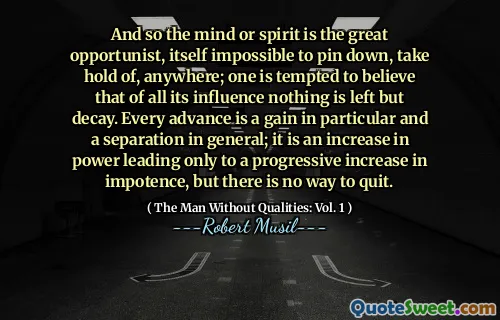Robert Musil was an influential Austrian writer, best known for his unfinished novel "The Man Without Qualities." Born in 1880, Musil's background included a blend of various influences—his father was a military engineer, and his mother came from a wealthy family. His diverse upbringing allowed him to explore various fields, including engineering and philosophy, before committing to a literary career. Musil's work often reflected the complexities of modern life, grappling with themes of identity, existence, and the shifting social landscape of early 20th-century Europe. Musil's writing is characterized by its philosophical depth and intricate narrative style. He sought to dissect the psychological and social underpinnings of individual behavior against the backdrop of a rapidly changing society. His characters often navigate a world of contradictions, exploring the tension between personal desires and societal expectations. Through his intricate narratives, Musil aimed to challenge conventional thought and provoke readers to reflect on their own lives and convictions. Despite his significant contributions to literature, Musil struggled for recognition during his lifetime. His works did not achieve widespread acclaim until after his death in 1942. Today, he is celebrated as a major figure in modernist literature, with "The Man Without Qualities" regarded as a landmark work. Musil's exploration of existential themes and his innovative narrative techniques continue to resonate with readers and scholars alike, solidifying his legacy as a vital voice in the literary canon.
Robert Musil was an influential Austrian writer, best known for his unfinished novel "The Man Without Qualities." Born in 1880, Musil's background included a blend of various influences—his father was a military engineer, and his mother came from a wealthy family. His diverse upbringing allowed him to explore various fields, including engineering and philosophy, before committing to a literary career. Musil's work often reflected the complexities of modern life, grappling with themes of identity, existence, and the shifting social landscape of early 20th-century Europe.
Musil's writing is characterized by its philosophical depth and intricate narrative style. He sought to dissect the psychological and social underpinnings of individual behavior against the backdrop of a rapidly changing society. His characters often navigate a world of contradictions, exploring the tension between personal desires and societal expectations. Through his intricate narratives, Musil aimed to challenge conventional thought and provoke readers to reflect on their own lives and convictions.
Despite his significant contributions to literature, Musil struggled for recognition during his lifetime. His works did not achieve widespread acclaim until after his death in 1942. Today, he is celebrated as a major figure in modernist literature, with "The Man Without Qualities" regarded as a landmark work. Musil's exploration of existential themes and his innovative narrative techniques continue to resonate with readers and scholars alike, solidifying his legacy as a vital voice in the literary canon.
More »
Today Birthdays
1729 -
Edmund Burke
1949 -
Haruki Murakami
1954 -
Howard Stern
1876 -
Jack London
1993 -
Zayn Malik
1951 -
Kirstie Alley
1863 -
Swami Vivekananda
1923 -
Alice Miller
1987 -
Naya Rivera
1825 -
Brooke Foss Westcott
1944 -
Joe Frazier
1951 -
Rush Limbaugh
1964 -
Jeff Bezos
1978 -
Jeremy Camp
1628 -
Charles Perrault
1856 -
John Singer Sargent
1970 -
Kaja Foglio
1953 -
Rick Santelli
1986 -
Gemma Arterton
1968 -
Raf Simons
1958 -
Christiane Amanpour
1966 -
Olivier Martinez
1996 -
Ella Henderson
1917 -
Maharishi Mahesh Yogi
1949 -
Ottmar Hitzfeld
1928 -
Ruth Brown
1968 -
Heather Mills
1946 -
George Duke
1968 -
Rachael Harris
1923 -
Ira Hayes
